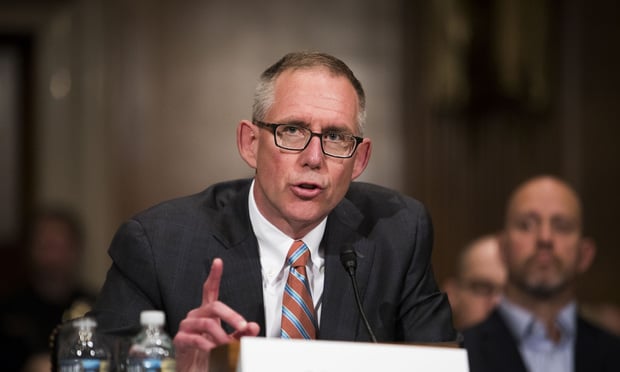 John Ring testifies duringhis confirmation hearing to be a member of the NLRB. (Photo: DiegoM. Radzinschi / ALM)
John Ring testifies duringhis confirmation hearing to be a member of the NLRB. (Photo: DiegoM. Radzinschi / ALM)
The Republican majority on the National Labor Relations Board onFriday adopted a new standard for determiningwhether a worker is an independent contractor or an employee,embracing a business-friendly approachthat could make it easier for companies to avoidsome union disputes.
|The ruling in the case SuperShuttle DFW Inc.could present broader implications for the gig economy and other industries that rely oncontractors and delivery drivers. Much of the gig economy is builton the backs of contractors, who can enjoy greater flexibility thantraditional employees. But independent contractors, unlikeemployees, cannot join a union, and they don't share many of theworkplace benefits that employees do.
|Related: Gig companies fight back against Californiaruling
|Trump-appointed NLRB Chairman John Ring, voting with fellow Republicanmembers William Emanuel and Marvin Kaplan, overturned an Obama-eradecision from 2014 involving FedEx delivery drivers who wanted toform a union. Democratic member Lauren McFerran dissented inFriday's decision.
|The board's ruling involved shuttle van drivers at Dallas FortWorth airport who wanted to be considered employees. SuperShuttleDFW before 2005 had considered its drivers to be employees. But thecompany subsequently switched to a franchise model that stillexists today. The franchises operated as independentbusinesses.
|The divided board rejected a push by the drivers arguing theywere employees and not contractors. The board said leasing orownership of work vans, method of compensation and control overtheir daily work schedules and working conditions provided thefranchisees with “significant entrepreneurial opportunity foreconomic gain.” The new standard clarified the role“entrepreneurial opportunity” plays in determining workerstatus.
|Writing in her dissent, McFerran said: “SuperShuttle's driversare not independent in any meaningful way, and they have littlemeaningful 'entrepreneurial opportunity.' Under well-establishedBoard law—reflected in decisions leading up to and includingFedEx—this should be a straightforward case.”
|In an amicus brief in an earlier federal appeals court, the U.S.Chamber along with other business groups urged the court to overturn theObama board's decision on the independent contractor standard.
|“Independent contractor relationships are voluntary arrangementsmutually beneficial to individuals and companies in the truckingindustry and other sectors of the economy,” lawyers fromJones Day wrote in thechamber's brief. “Where, as here, an independent contractor hassubstantial entrepreneurial opportunities, not to mentionsubstantial control over whether and with whom to work, both theboard and the courts should be exceedingly cautious beforedisregarding the parties' decision to structure the relationship asan independent contractor arrangement.”
|Disputes over whether a worker is an independent contractor oremployee have posed central questions in cases involving companiessuch as Uber and Lyft. A California Supreme Court ruling last yearmade it harder for companies to justify classifying their workersas contractors. That ruling has created added uncertainty forcompanies, and courts are confronting whether the decision shouldbe applied retroactively.
|Read more:
Complete your profile to continue reading and get FREE access to BenefitsPRO, part of your ALM digital membership.
Your access to unlimited BenefitsPRO content isn’t changing.
Once you are an ALM digital member, you’ll receive:
- Critical BenefitsPRO information including cutting edge post-reform success strategies, access to educational webcasts and videos, resources from industry leaders, and informative Newsletters.
- Exclusive discounts on ALM, BenefitsPRO magazine and BenefitsPRO.com events
- Access to other award-winning ALM websites including ThinkAdvisor.com and Law.com
Already have an account? Sign In
© 2024 ALM Global, LLC, All Rights Reserved. Request academic re-use from www.copyright.com. All other uses, submit a request to [email protected]. For more information visit Asset & Logo Licensing.








